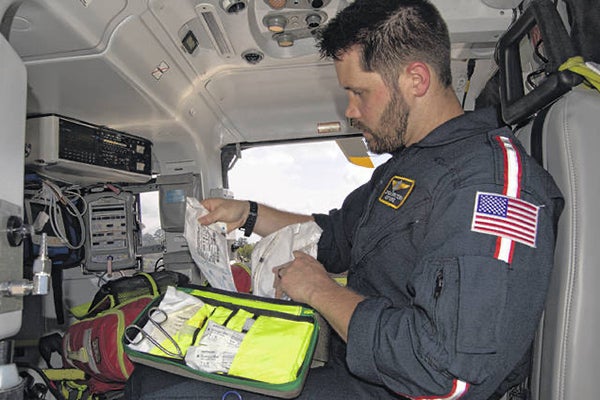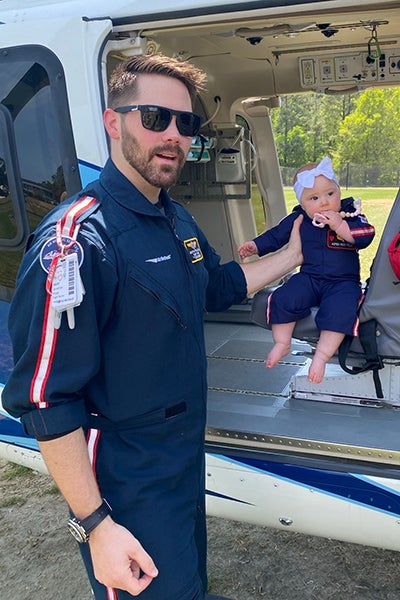ECU alum takes Pirate nursing to the skies
Jonathan Polak grew up in Pittsboro playing baseball.
He dreamed of playing at college and did at North Greenville University in South Carolina. After a few years of schooling, his original plan of applying to medical or physical therapy school didn’t seem the right path.
A bit of research brought him to nursing.

East Carolina University College of Nursing alum Jonathan Polak inventories supplies in his air ambulance. (Contributed photos)
“I got my LPN (licensed practical nurse) in 2013 and I went on to work three years of long-term care, acute rehab and hospice care as well,” Polak said. It was fulfilling, but not the best fit.
A ride-along flight on one of Duke University Medical Center’s Life Flight air ambulances reset his perspectives. Polak knew what he wanted to do, but he needed more schooling. The nurse in the back of the helicopter needs incredible skill to direct the life-saving actions — both in the helicopter and prepping the hospital-based medical staff to accept the patient once the aircraft touches down on the hospital’s roof.
He worked at Cape Fear Valley Medical Center in Fayetteville as a licensed practical nurse while completing his associate in nursing degree (ADN) — the qualification that credentialed him to be a registered nurse and put him in a flight suit.
After paying his dues at Duke’s Cardiothoracic Intensive Care unit and working with the critical care transport teams, he had an in. He now flies as an air ambulance nurse based in the Sandhills, where he lives with his wife and expanding family.
To continue to progress in his career, he needed more education. The online ADN to Bachelor of Science in nursing program at East Carolina University’s College of Nursing was an easy choice.
“The process was really smooth, really easy. It was exactly what I needed to get to get to where I am now,” Polak said. He believes the quality of the education he received through ECU’s online program put him in a strong position to be accepted to the acute care nurse practitioner degree program he is currently enrolled in.
“My bachelor’s degree helped make that process a lot easier. Universities recognize ECU’s nursing programs as being excellent,” Polak said.
Polak said that ECU is a special place with “a spirit and passion that is unmatched by other universities,” which helped to make him a “Pirate through and through.”
Mark Hand, clinical professor of nursing and the faculty advisor for the ECU chapter of the American Association of Men in Nursing, said that as a student, and now an alumni representative of Pirate nursing, Polak is a model for future generations of male nurses.
“Jonathan was determined to continue his education to be the best trauma and emergency care nurse,” Hand said. “As a male nurse, Jonathan has been a role model to current male nursing students and demonstrates a high level of intellectual curiosity, independence and self-motivation.”
Need for men in nursing
An April 2023 American Association of College of Nursing analysis of Census Bureau data showed that, while the percentage of men in nursing has grown significantly in recent decades, the percentages have plateaued at around 13% in recent years.

Polak poses with his daughter in an air ambulance.
Polak agrees there is a need for greater representation of men in the female-dominated nursing profession, and while there is a healthy balance of men and women in flight nursing, the high-adrenaline environments of emergency medicine might be well-suited for men.
Air ambulances often use a paramedic-nurse model for patient care, which Polak believes is a great combination of the training and skill sets that each brings to bear at a car crash or other emergency situation that produces traumatic injuries.
“Paramedics understand the flow of that environment; how to manage patients in that rapidly changing pre-hospital environment,” Polak said. “When you are an ICU nurse, your expectations and how you perceive patient care is way different, and that’s really a good thing.”
The difference in patient management in the hospital versus in the back of a tiny helicopter is stark, Polak said, even for routine hospital-to-hospital transfers.
“Being a flight nurse is a very autonomous job and the expectations are extremely high. One of our medical directors would say, ‘I’m going treat you like a third-year resident. That’s the expectation we’re going to have of you,’” Polak said. “At the end of the day the skills, practices, knowledge and understanding of how to take care of critically ill patients come from the bachelor’s degree.”
“If I’m taking a patient out of a hospital in a calm ICU setting, throwing them into a helicopter, and now there’s all the shaking, vibration and turbulence, sedation is going to have to be different. How I manage their hemodynamics is going to be different,” Polak said.
Research shows that patient outcomes improve when health care teams are more diverse. With only 12% of nurses being men, male patients generally don’t see themselves in the nursing staff that they encounter in clinics and hospitals, which could hinder the care they receive.
In Polak’s experience, having men at the bedside can help give the nursing team added tools in their toolkit, especially with patients who are combative or aggressive. Polak said that male nurses are able to manage patients differently than female nurses: not better, just differently.
“A lot of patients would prefer, for privacy reasons, a male nurse because they may feel uncomfortable with a woman having to touch them to do a procedure,” Polak said.
Being a nurse, Polak said, means understanding the balance between tough love and compassion. He urges men who are interested in being nurses to do some soul searching to find that compassion center within themselves to tap into when fatigue or inevitable frustrations bubble up.
“Men are full of compassion and love,” Polak said. “However, we men, by nature, show it differently. It doesn’t matter how masculine you may be. I’ve personally seen the most masculine of male figures provide exceptionally passionate and robust care.”
Polak said he had to tap into his compassion reservoir when working in hospice care, which brought him great personal and professional satisfaction. When helping the sickest of the sick patients — and often their families even more so to navigate the shoals of pain and impending grief — having a good handle on the “why” of providing compassionate care is tremendously important.
“One of the most romantic things in health care is being there for somebody when they need your help or your love the most. And I think men can be some of the best at that,” Polak said. “Just being there; just having a presence. I really enjoyed hospice care, the short time that I did it.”
“Unfortunately, I love critical care medicine a whole lot more.”